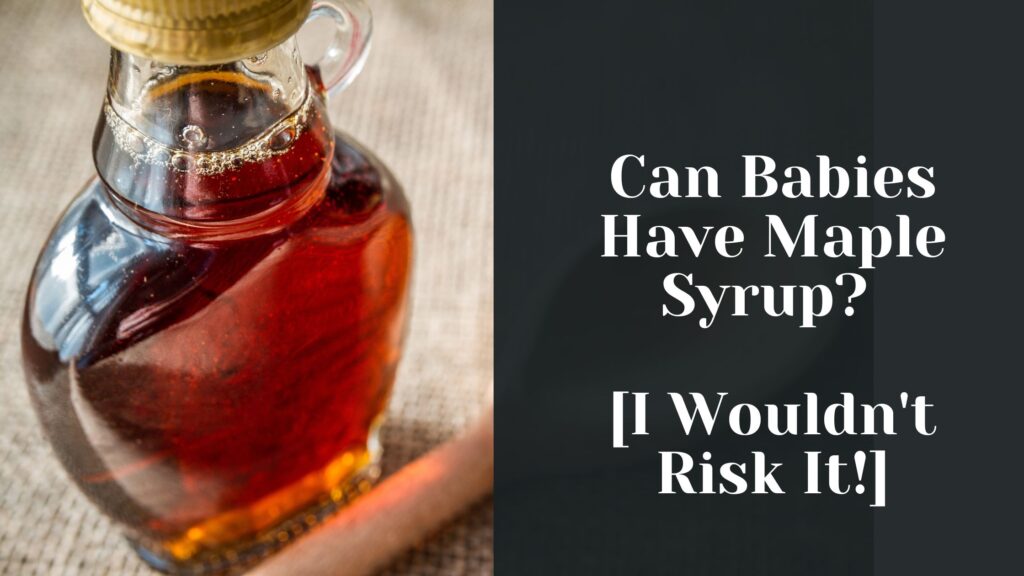According to Statista, over 249 million Americans will consume pickles in 2022.
Pickles are made by immersing cucumbers in vinegar, brine, or other acidic liquid, which initiates a fermentation process that allows cucumbers to be preserved for an extended period of time.
But does this process make it dangerous for babies to consume pickles? Or can babies eat pickles?
In this post, you will learn:
- If and when babies can eat pickles
- Pros and cons of feeding pickles to your child
- How to serve pickles to your baby
- And more!
Can Babies Eat Pickles?
Yes, babies can eat pickles when they are ready to consume solid foods at 6 months old. However, feed in moderation since pickled food is high in sugar and sodium. Consuming too much sodium can lead to high blood pressure, kidney damage, and heart disease. In addition, pickles are acidic and can cause diaper rash.
According to Pubmed, there is a link between high consumption of sodium in the first two years of a child’s life and cardiovascular disorders.
In addition, a study demonstrated that adding too much sodium to your baby’s can result in salt cravings later in life.
These two reasons alone should be enough to want to feed pickles to your babies in moderation.
When Can Babies Have Pickles?
You can begin feeding pickles to your baby as soon as they are ready to consume solid foods.
The American Academy of Pediatrics states that babies can start eating solid foods at 6 months.
However, all kids are different, so make sure you consult your pediatrician to ensure your baby is ready to switch to solid foods.
Usually, you can tell a child is read if:
- They sit up straight
- They hold their head up
- They show an interest in what is in your plate
- They no longer reject the food you give them
Cons Of Giving Pickles To Your Baby
Unfortunately, feeding too many pickles to your baby comes with various cons:
1. Pickles Are High In Sodium
According to the Center For Diseases Control and Prevention, around 90% of Americans aged 2+ eat too much sodium.
And consuming too much sodium can result in health problems such as:
- Heart disease
- Stroke
- High blood pressure
- Kidney disease
For this reason, it is crucial to keep sodium intake at 120 milligrams (mg) for infants aged 0 to 6 months old and to keep it at 370 milligrams (mg) from 7 to 12 months.
On average, 10 grams of pickles contain 120 mg of sodium, so here is what I recommend:
- Give your 6 months old baby no more than 10 grams of pickles once or twice a week
- Give your 7 months old, 8 months old, 9 months old, 10 months old, 11 months old, or one year old no more than 30 grams of pickles once or twice a week
Please bear in mind that sodium content may vary depending on the type of pickle you choose and its preparation method.
Always look at the label and purchase pickles marked as low sodium.
Make sure you speak to your pediatrician for further and accurate advice.
2. Acidic Foods Can Cause an Upset Stomach
The acid liquid used to pickle cucumbers may cause your baby to have an upset stomach.
Some babies are more sensitive to others when it comes to acidic foods, so make sure you keep an eye on how your baby reacts after feeding them pickles.
Acidic foods can also trigger reflux, so make sure you stop feeding pickles to your baby if you observe these issues.
3. Pickles Can Give Babies Diaper Rash
The acidic content of pickles can result in diaper rash in babies.
In fact, not only do acidic foods may irritate your infant’s skin, they can also upset the baby’s stomach and lead to diarrhea.
Diarrhea increases the risk of diaper rash.
Pros Of Giving Pickles To Your Baby
As I mentioned earlier, pickles are high in sodium and should always be fed in moderation.
But that does not mean that pickles do not have pros!
1. Fermented Food Promotes Gut Health
Pickles are made by fermenting cucumbers using an acidic liquid such as vinegar or brine.
According to Stanford researchers, fermented foods can boost immune response and improve gut health.
So, feeding pickles in moderation can help your child’s digestion.
2. Pickles Can Help Sooth Teething Gums
Pickles are also a great snack for teething babies as they provide a cooling sensation on the sore gums.
Chewing on pickles and savoring their taste will also distract your teething baby from the gum pain they are experiencing!
How To Serve Pickles To Baby
Pickles can be hard to chew since they have a hard skin. This is especially true if your baby has no teeth at all.
For this reason, you should never give your baby a whole pickle, both due to the fact it would be too much sodium for them and because it could become a choking hazard.
Instead, remove the pickle skin and slice or chop the pickle before serving.
Remember:
On average, 10 grams of pickles contain 120 mg of sodium (Check label for accurate information.
Keep sodium intake at 120 milligrams (mg) for infants aged 0 to 6 months old and 370 milligrams (mg) from 7 to 12 months.
Furthermore, make sure you supervise your child to prevent them from choking.
Can Pickles Cause Diarrhea In Toddlers?
Pickles per se are not the issue, but the high amount of sodium found in pickles can result in digestive problems.
You are probably feeding your toddler too many pickles/too much sodium if you see the following:
- Diarrhea
- Bloating
- Abdominal pain
Do Pickles Give Babies Gas?
Yes, pickles can give babies gas due to their high sodium content.
When feeding pickles to your baby, make sure you take into account any other foods that contain sodium and that you may have given your baby throughout the day/week.
In fact, even breast milk and baby formula themselves contain some sodium!
Can Babies Be Allergic To Pickles?
Yet, pickles can cause allergic reactions in your baby, but most likely due to the preservatives and additives present in the mix.
Here are the preservatives that can cause allergic reactions, not just when added to pickled food:
- Spices such as cloves, cinnamon, and garlic
- Vinegar
- Sodium Sulfite
- Sodium Metabisulfite
- Sodium Bisulfite
However, there is still a chance your baby may be allergic to the pickled vegetable itself.
Aside from cucumbers, here is a list of vegetables that can be pickled and that can cause allergic reactions:
- Asparagus
- Bell peppers
- Green beans
- Mushrooms
- And more!.
Symptoms Of Pickle Allergy In Babies
There aren’t any specific symptoms for pickle allergy in babies. Instead, the symptoms present themselves just like any other food allergy.
Allergic reactions may occur immediately or after an hour.
Here are a few of the symptoms you may observe on your baby:
- Itchy rash (hives)
- Vomiting
- Stomach Pain
- Diarrhea
- Wheezing
- Tingling in the tongue, mouth, and palate
- Shortness of breath
- Tongue or lips swelling
- Itchy or red skin
Remember that the allergic reaction will likely be caused by the preservatives used in the pickles, rather than by the pickles themselves.
Some allergic reactions can become severe and result in anaphylaxis.
Symptoms of anaphylaxis are:
- Swollen tongue
- Chest tightness
- Struggling to breath
- Struggling to speak
- Feeling faint or dizzy
Make sure you call your pediatrician immediately if you observe any of the above symptoms on your baby.
Conclusion
Although babies can eat pickles, make sure you wait until your infant is ready to eat solid foods.
Always check the product label to stick to nutrition guidelines.
Things to keep in mind:
- Feed pickles in moderation to avoid high sodium consumption
- Supervise your child to prevent them from choking
- Watch out for any allergic reactions.


